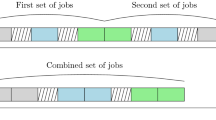Abstract
This paper aims at minimizing the total completion time together with the maximum lateness. Jobs are processed by parallel machines in batches. A setup is required before processing a batch, which is common for all jobs in the batch. Jobs are continuously processed after the setup time. The processing length of a batch is the sum of the setup time and processing times of the jobs it contains. Due to the availability constraint, the completion time of a job is the time when a batch is totally processed. Considering due dates, the jobs need to be processed in a way that the total completion time and the maximum lateness are minimized. This problem is a kind of NP-hard so first we present a constructive heuristic to solve the problem. Then we propose a genetic algorithm whose initial population is formed by using the heuristic approach. Computational experiments are carried out to evaluate the performance of the proposed algorithms.
Similar content being viewed by others
References
Allahverdi A., Gupta J.N.D., Aldowaisan T. (1999) A review of scheduling research involving setup considerations, Omega. International Journal of Management Science 27: 219–239
Allahverdi A., Ng C.T., Cheng T.C.E., Kovalyov M.Y. (2008) A survey of scheduling problems with setup times or costs. European Journal of Operational Research 187: 985–1032. doi:10.1016/j.ejor.2006.06.060.
Azizoglu M., Kondakci S., Koksalan M. (2003) Single machine scheduling with maximum earliness and number tardy. Computers & Industrial Engineering 45: 257–268. doi:10.1016/S0360-8352(03)00034-2.
Azizoglu M., Webster S. (2003) Scheduling parallel machines to minimize weighted flowtime with family set-up times. International Journal of Production Research 41: 1199–1215. doi:10.1080/0020754021000042959.
Blazewicz J., Kovalyov M.Y. (2002) The complexity of two group scheduling problems. Journal of Scheduling 5: 477–485. doi:10.1002/jos.118.
Brucker P. (2007) Scheduling algorithms. Springer, Berlin, Heidelberg
Brucker P., Kovalyov M.Y., Shafransky Y.M., Werner F. (1998) Batch scheduling with deadlines and parallel machines. Annals of Operations Research 83: 23–40. doi:10.1023/A:1018912114491.
Bukchin J., Masin M. (2004) Multi objective lot splitting for a single product m-machine flowshop line. IIE Transactions 36: 191–202. doi:10.1080/07408170490245487.
Coello Coello, C. A. (1999). A Comprehensive survey of evolutionarybased multiobjective optimization techniques. International Journal of Knowledge and Information Systems, 1, 269–308.
Coello Coello C.A. (2000) An undated survey of GA-based multiobjective optimization techniques. ACM Computing Surveys 32: 109–143. doi:10.1145/358923.358929.
Coello Coello C.A., Van Veldhuizen D.A., Lamont G.B. (2002) Evolutionary algorithms for solving multi-objective problems. Kluwer, New York
Collette, Y., Siarry, P. (2004). Multiobjective optimization: Principles and case studies. Springer.
Deb K. (2001) Multi-objective optimization using evolutionary algorithms. Wiley, Chichester, UK
Deb, K., Agrawal, S., Pratap, A., Meyarivan, T. A. (2000). Fast elitist nondominated sorting genetic algorithm for multi-objective optimization: NSGA-II. In M. Schoenauer et al. (Ed.), Proceedings PPSN 2000, LNCS(Vol. 1917, pp. 849–858). Springer.
Goldberg D.E. (1989) Genetic algorithms in search, optimization and machine learning. Massachusetts, Addison Wesley
Gupta J.N.D., Ruiz-Torres A.J. (2000) Minimizing makespan subject to minimum total flow-time on identical parallel machines. European Journal of Operational Research 125: 370–380. doi:10.1016/S0377-2217(99)00386-0.
Haral U., Chen R.W., Ferrell J.W.G., Kurz M.B. (2007) Multiobjective single machine scheduling with nontraditional requirements. International Journal of Production Economics 106: 574–584. doi:10.1016/j.ijpe.2006.06.018.
Haupt R.L., Haupt S.E. (1998) Practical genetic algorithms. Wiley, New York
Hoogeveen H. (2005) Multicriteria scheduling. European Journal of Operational Research 167: 592–623. doi:10.1016/j.ejor.2004.07.011.
Kindt V.T., Billaut J.-C. (2006) Multicriteria scheduling: Theory, models and algorithms (2nd ed). Springer, Berlin
Liaee M.M., Emmons H. (1997) Scheduling families of jobs with setup times. International Journal of Production Economics 51: 165–176. doi:10.1016/S0925-5273(96)00105-3.
Lin B.M.T., Jeng A.A.K. (2004) Parallel-machine batch scheduling to minimize the maximum lateness and the number of tardy jobs. International Journal of Production Economics 91: 121–134. doi:10.1016/j.ijpe.2003.07.003.
Liu Z., Yu W., Cheng T.C.E. (1999) Scheduling groups of unit length jobs on two identical parallel machines. Information Processing Letters 69: 275–281. doi:10.1016/S0020-0190(99)00026-5.
Loukil T., Teghem J., Tuyttens D. (2005) Solving multi-objective production scheduling problems using metaheuristics. European Journal of Operational Research 161: 42–61. doi:10.1016/j.ejor.2003.08.029.
Ruiz-Torres A.J., Lopez F.J. (2004) Using the FDH formulation of DEA to evaluate a multi-criteria problem in parallel machines scheduling. Computers Industrial Engineering 47: 107–121. doi:10.1016/j.cie.2004.06.002.
Sarin S.C., Prakash D. (2004) Equal processing time bi criteria scheduling on parallel machines. Journal of Combinatorial Optimization 8: 227–240. doi:10.1023/B:JOCO.0000038909.06086.ed.
Schutten J.M.J., Leussink R.A.M. (1996) Parallel machine scheduling with release dates, due dates and family setup times. International Journal of Production Economics 46(47): 119–125. doi:10.1016/0925-5273(95)00086-0.
Solimanpur M., Vrat P., Shankar R. (2007) A multi-objective genetic algorithm approach to the design of cellular manufacturing systems. International Journal of Production Research 42: 1419–1441. doi:10.1080/00207540310001638073.
Srinivas N., Deb K. (1994) Multi-objective optimization using non-dominated sorting in genetic algorithms. Journal of Evolutionary Computation 2: 221–248. doi:10.1162/evco.1994.2.3.221.
Taboun S.M., Abib A.H., Atmani A. (1995) Generating efficient points of bi criteria scheduling problem by using compromise programming. Computers & Industrial Engineering 29: 227–231. doi:10.1016/0360-8352(95)00076-D.
Van Veldhuizen D.A., Lamont G.B. (2000) Multi-objective evolutionary algorithms: Analyzing the state-of-the-art. Evolutionary Computation 8: 125–147. doi:10.1162/106365600568158.
Webster S., Azizoglu M. (2001) Dynamic programming algorithms for scheduling parallel machines with family setup times. Computers & Operations Research 28: 127–137. doi:10.1016/S0305-0548(99)00094-5.
Wittrock R.J. (1990) Scheduling parallel machines with major and minor setup times. International Journal of Flexible Manufacturing Systems 2: 329–341. doi:10.1007/BF00186472.
Yi Y., Wang D.W. (2001a) Tabu search for scheduling grouped jobs on parallel machines. Journal of Northeastern University 22: 188–191
Yi Y., Wang D.W. (2001b) Scheduling grouped jobs on parallel machines with setups. Computer Integrated Manufacturing Systems 7: 7–11
Author information
Authors and Affiliations
Corresponding author
Rights and permissions
About this article
Cite this article
Sabouni, M.T.Y., Jolai, F. & Mansouri, A. Heuristics for minimizing total completion time and maximum lateness on identical parallel machines with setup times. J Intell Manuf 21, 439–449 (2010). https://doi.org/10.1007/s10845-008-0191-4
Received:
Accepted:
Published:
Issue Date:
DOI: https://doi.org/10.1007/s10845-008-0191-4




